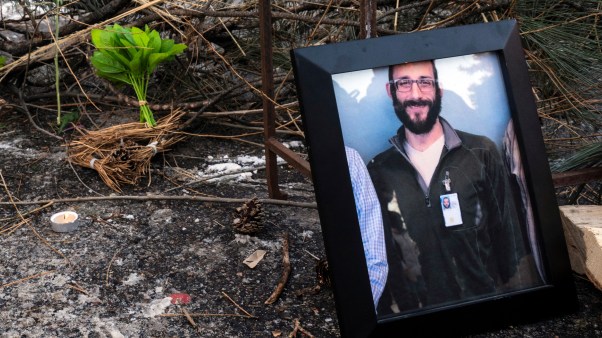Chinese calligrapher Lü Xiaokui spent decades transcribing Confucian, Daoist, and Buddhist texts into elegant xiaokai script. When he came across a friend’s message about an initiative to copy the Bible by hand on the Chinese messaging app WeChat in 2019, he reached out to the organizer, Wang Wenfeng, to express his interest in participating.
“At first, we were pretty surprised, because he wasn’t a believer,” Wang said. “We weren’t sure if—or why—he’d actually go through with it.”
Several months later, Lü sent Wang, who now pastors SanQi church in Beijing, a beautifully penned copy of the Gospel of John. When they saw Lü’s submission, Wang and his fellow church members were stunned by Lü’s careful, detailed brushwork.
As Lü handwrote the Book of John, he encountered stories about Jesus. The more he read the Bible, the more he longed to become a child of God.
That December, Wang baptized Lü in Shenzhen in front of Lü’s family and friends, publicly declaring a transformation that had begun with ink and paper.
In a time when religious expression is often curtailed and many Chinese churches operate in isolation, copying the Bible on paper has become a shared language, a spiritual discipline, and a form of quiet resilience among believers in the country.
Since the initiative launched six years ago to mark the centennial of the Chinese Union Version (CUV) translation, Wang estimates that tens of thousands of churches and millions of individuals in China have taken part in the Bible hand-copying initiative.
Initially, Wang and his church members set a modest goal of getting 1,189 participants—corresponding with the total number of chapters in Scripture—who would each write out a chapter for a commemorative manuscript of the CUV.
Within days of sharing this idea online, however, thousands of responses from believers at underground house churches and officially recognized Three-Self Patriotic Movement (TSPM) churches flooded Wang’s WeChat. “They wanted to draw closer to God, find stillness in a noisy world, and reconnect with family and church,” Wang said.
To meet the overwhelming demand, Wang and his team designed printable Bible-copying templates and circulated them through WeChat. Soon, people were uploading photos charting their daily progress in writing Scripture to WeChat, exchanging testimonies, and forming Bible-copying circles.
Wang heard stories from Christians around the country of lives changed. One Christian family who was dispersed in various parts of China had not sat together for years, as some members attended registered TSPM churches while others worshiped at unregistered house churches.
But when each family member signed up to copy a portion of Scripture, they began exchanging Bible verses, asking about each other’s chapters, and praying together. “For the first time, we remembered that we are not just family members by blood—we are all God’s children,” one family member wrote in a WeChat message to Wang. “The ink reminded us.”
Chen Huai, a Sunday school teacher in Zhejiang, a province in eastern China, felt concerned that her Christian colleagues were spending too much time playing online games. She invited them to hand-copy the Bible with her. In three years, Chen and her colleagues copied the entire CUV translation, draining 170 pens along the way.
A 70-year-old grandmother from the same province also decided to participate. Despite being illiterate, she enlisted her grandchildren to help her recognize characters and correct mistakes in her writing. Slowly, stroke by stroke, she drew her way through the New Testament.
A former drug addict, whose right hand became paralyzed due to past substance abuse, began copying Scripture with his untrained left hand. A teenager with autism spent years illustrating entire chapters. A toddler, still in diapers, insisted on clutching a sheet of paper and filling it with scribbles as her mother wrote Bible verses out.
Still, the project faced some challenges. When several churches first launched the project, everyone picked short or compelling chapters to copy. No one volunteered for Numbers or Chronicles. Eventually, people had to draw lots, picking strips of paper from a cup with chapter numbers on them.
As scores of handwritten Bible copies poured into his mailbox from individuals, families, and entire churches, Wang was moved by the reverence and zeal he witnessed in these believers. He felt awed by the sheer volume of copies and wrestled with how to preserve them all. Many documents were elaborately bound, painstakingly illustrated, or accompanied by personal testimonies.
To honor and safeguard these works, Wang transformed a five-story house in Wenzhou, which was entrusted to him by his parents, into a Bible museum in 2023. For several years, visitors could enter and admire the various hand-copied works displayed there.
But this March, after activities at the museum drew local authorities’ attention—not because of its religious content but because the influx of visitors had reportedly disrupted the city’s transportation—Wang decided to close the museum to the public. Today, the space functions as a private repository of handwritten Bibles.
As Wang shepherded the Bible hand-copying movement, he experienced long seasons of physical and mental exhaustion. To convert the house into a museum, he had to sell his property in Beijing to fund its renovation, which created financial strain. All this also took place during the height of the COVID-19 pandemic, when rumors and fears of Christian gatherings getting reported to the authorities began swirling.
“There were moments when I wondered if I would be taken away [by the authorities],” he said. “I had already prepared my heart for it.”
Yet, no officials came to question Wang about the initiative and no official orders arrived to stop it, even as the Chinese government was shuttering churches, closing Christian bookstores, and increasing its scrutiny of religious activities across the country.
“It was like God covered it with his hand,” Wang said. “That’s the only explanation.”
Instead of a government crackdown, Wang believes he witnessed a revival—one not loud and obvious but rather quiet and embodied. “When you write the Bible by hand, it enters not only your mind, but your muscles,” Wang said. “Your heart begins to slow down to match the rhythm of the Word.”
One believer in Beijing told Wang that he used to speed-read devotions and forget what they said immediately after. “But now, the verses stay with me,” he said. “They’re not just in my Bible—they’re in me.”
Wang never intended to create a campaign to convince people to read physical Bibles over screens. Instead, the Bible-copying initiative was an organic, spontaneous, and deeply spiritual movement that demonstrated the power of God’s Word to draw people toward him, he said.
The biggest takeaways from this initiative should not be numbers, strategy, or who the organizers are, Wang added. “The real protagonists are the Bible copiers—millions of believers who didn’t need a stage or a microphone, just a pen and a Bible,” he said.
Six years on, the Bible hand-copying initiative has not slowed down. Participation keeps growing across China. Lü, the calligrapher, is now copying the entire CUV translation.
“It’s not just about writing,” Lü said. “It’s how I draw near to God, one character at a time.”
A previous version of this piece was published on ChinaSource.

















